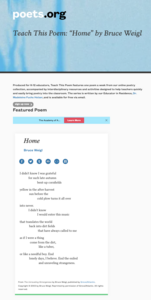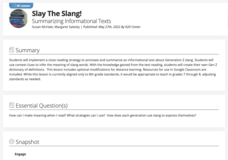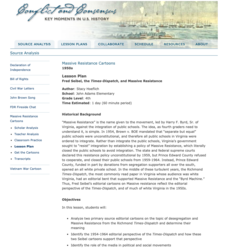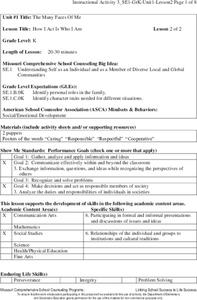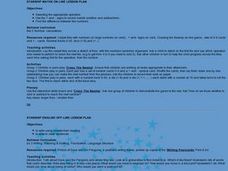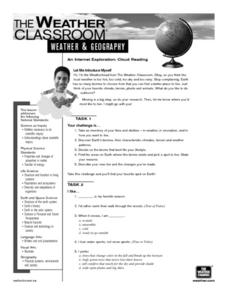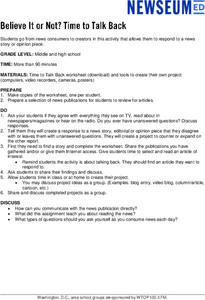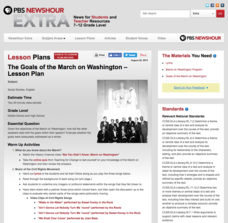Academy of American Poets
Teach This Poem: "In the Next Galaxy" by Ruth Stone
Imagine what life might be like in a different galaxy. That's the challenge young scientists take on in a warm-up activity designed to prepare them for a close reading of Ruth Stone's poem "In the Next Galaxy." After class members share...
Academy of American Poets
Teach This Poem: “Home” by Bruce Weigl
A poetry lesson takes a close look at home. Scholars discuss with partners what they are most grateful for at their homes. A timelapse video showcases potato tubers growing. While watching, pupils write down what they notice. Learners...
K20 LEARN
Slay the Slang! Summarizing Informational Texts
Middle schoolers get hip to the jive with a lesson about slang. They closely examine examples of slang and use context clues to infer the meaning of the terms. Groups read and summarize an article about a teacher who created a Gen Z...
Curated OER
Lesson #2 ~ Nanoscience and Nanotechnology
You might love this lesson, or you might not. Basically, high school scientists read through a script in which someone interviews a physicist, a biologist, and a chemist in regard to their use of nanotechnology. The names of the involved...
Curated OER
Stargirl Lesson
Students read a short novel while filling in a graphic organizer for problem and solution. In this sociology lesson, students use a prior knowledge and relate the text to theirselves and to think about their own need to fit in versus...
Curated OER
Lesson Plan 6: Introducing the Elements of Plot-Part Two
November is National Novel Writing Month, so if your young authors are embarking on this journey, be sure they understand plot elements. This collaborative lesson fits into the context of the larger NaNoWriMo project; however, the ideas...
Curated OER
The Finer Things in Life
Momoyama and Edo are periods in Japanese history that can be defined culturally and artistically. Learners explore and discuss how the samurai used sword guards and grip enhancers. Pupils read the story "The Inch-High Samurai," examine...
Center for History and New Media
Growing Up in a Segregated Society, 1880s–1930s
What did segregation look like in the beginning of the 20th century? Middle and high schoolers view images of segregated areas, read passages by Booker T. Washington and W.E.B. DuBois, and come to conclusions about how the influence of...
Agency for Toxic Substances and Disease Registry
Don't Mess with Mercury (Lesson A)
Mercury is the only metal that is a liquid at room temperature. Teach your class this and many more interesting mercury facts by assigning an engaging task. A public relations activity, the exercise informs pupils of the hazards of...
Daughters of the American Revolution
Lesson 2: How Do We Determine the Value of Education?
Have women always had the same educational opportunities as their male counterparts? Young historians read an 1819 essay by Emma Willard on the state of female education in the 19th century before discussing their views regarding women's...
Roy Rosenzweig Center for History and New Media
Fred Seibel, the Times-Dispatch, and Massive Resistance
A lesson plan challenges scholars to analyze editorial cartoons created by Fred Seibel, illustrator for the Times-Dispatch, during the Massive Resistance. A class discussion looking at today's editorial pages and Jim Crow Laws leads the...
Missouri Department of Elementary
How I Act Is Who I Am
A lesson centers itself around the topic of family roles. A whole-class discussion uses puppets and posters to go in-depth into the following character traits; caring, responsibility, respect, and cooperation. The discussion closes with...
BBC
Starship English and Math - Online Lesson Plans
Two online lessons, one in math and one in language arts, are here for you. In them, learners play online games which reinforce important skills in literacy and numeracy. The thing I like about both of these lessons is that they get the...
Curated OER
Cloud Reading
Learners identify the biomes of the Earth and their characteristics. They discuss their favorite seasons and the weather. They share their favorites with the class.
Curated OER
2nd grade Reading
Read the story Alexander's Terrible Horrible No Good Very Bad Day to your second grade class. They will either draw a picture of the part of the story that they liked the best or write one sentence about the part that made them laugh....
Newseum
Believe It or Not? Time to Talk Back
Young journalists select a news story, editorial, or opinion piece that they disagree with or one that leaves them with questions. They then create their report in response and share it with the class.
Curated OER
Ivan the Fool: Lesson 1
Learners read and analyze a classic Eastern European folktale. In partners, they read the story, take notes, define vocabulary terms, and write a summary of the folktale.
Curated OER
Alexander and the Terrible, Horrible, No-Good, Very Bad Day
Second graders interact with the story of Alexander's horrible day by connecting it to their lives. They practice predicting, writing paragraphs, reading aloud, discussing his problems, making a card to cheer him up, and designing a pair...
Curated OER
Understanding American Values
Scholars read books and discuss emotions that lead up to the American Revolution. They also discuss vocabulary and use reference materials to research the Internet for causes and sentiment that led to the American Revolution.
Curated OER
A Read-In
Students explore philosophy by participating in a philanthropic activity. In this book read-in lesson plan, students collect a group of used books and illustrate an image to go along with the story. Students donate these books to a...
Curated OER
You Are What You Read
Sixth graders select a prose, poetry, or nonfiction excerpt from a book of their choice and share it by reading aloud to their classmates, who identify the genre and respond to related questions in their journals.
Curated OER
Arthur's New Puppy Directed Reading Lesson (Elementary, Reading/Writing)
Students listen and take part as teacher and classmates give a definition and examples of responsibility, then brainstorm what Arthur needs to do to prepare for his puppy's arrival. The story be read as a total group and then talked about.
Historical Thinking Matters
Spanish-American War: 1 Day Lesson
After analyzing newspaper articles portraying different perspectives of the explosion of the Battleship USS Maine, your young historians will take a stand on which position is the most believable in both discussion and writing.
PBS
The Goals of the March on Washington
Who else had a dream other than Martin Luther King, Jr.? Pupils explore civil rights leaders in a fourth lesson out of a series of five about people who paved the way to freedom for African Americans. The inquiry-based unit has your...



